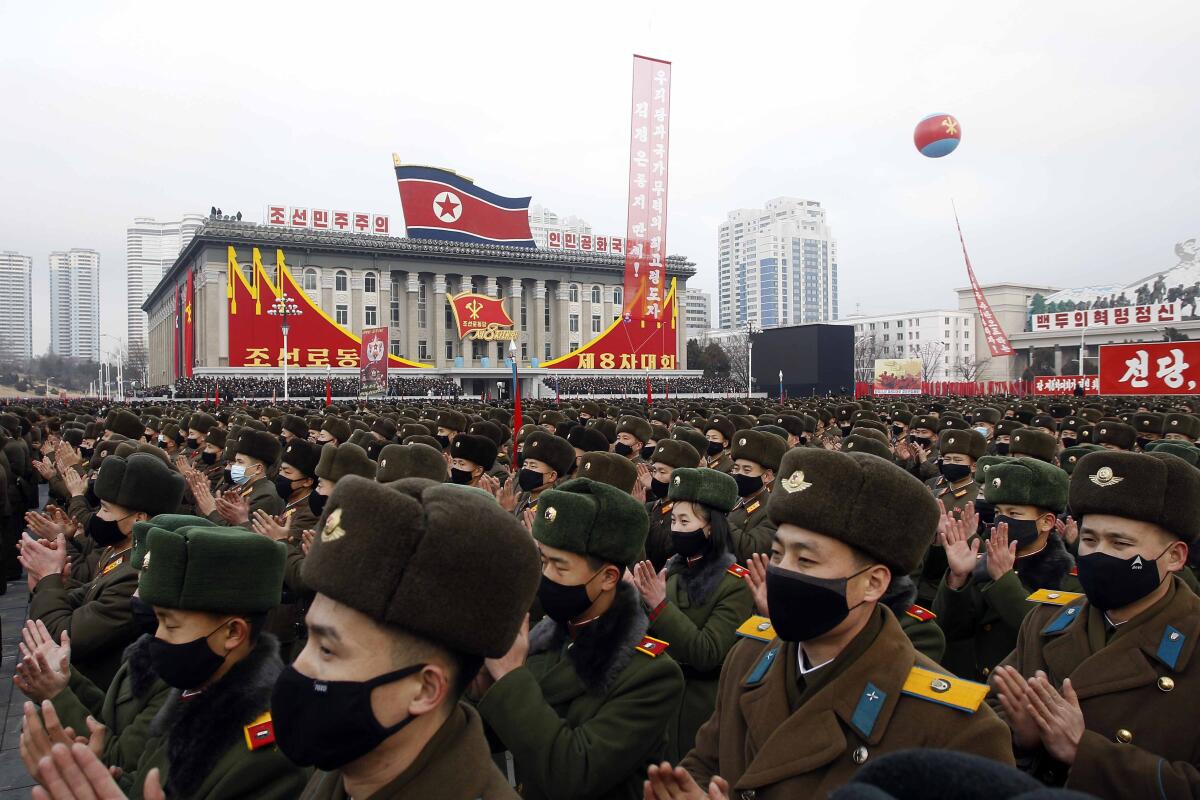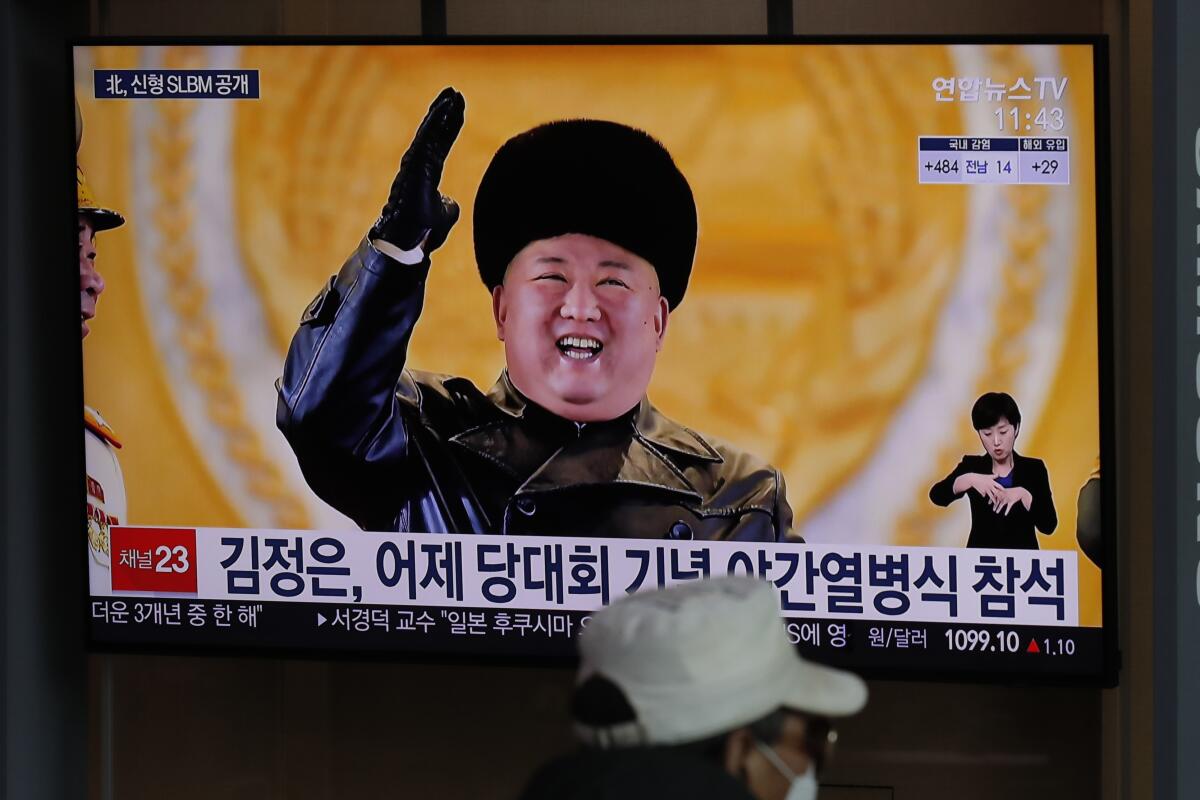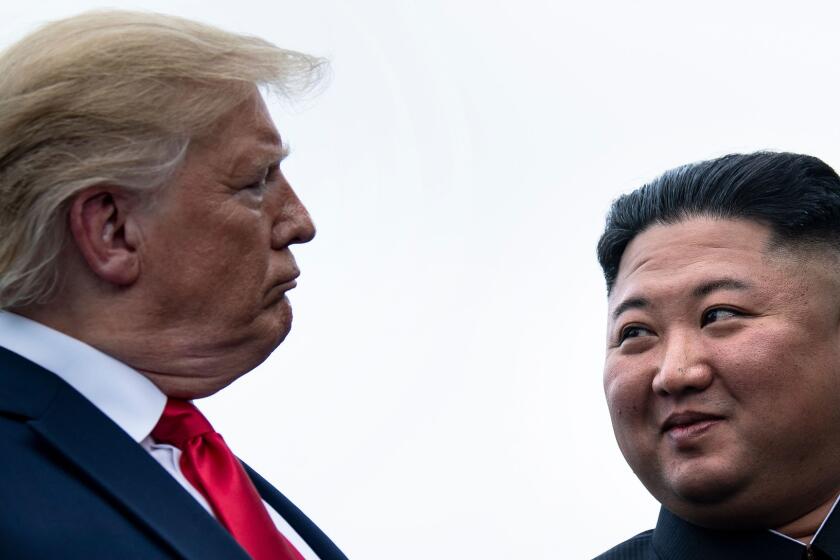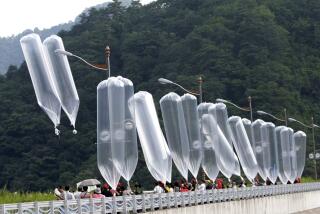Can Kim Jong Unâs economic ambitions survive the COVID-19 pandemic?

SEOUL â After declaring three years ago that his country had fulfilled its decades-long ambition to become a nuclear power, North Korean leader Kim Jong Un turned his attention to fixing an ailing economy that was undermining his pledge to better the lives of his people.
Since then, in the face of heavy international sanctions restricting trade and most financial transactions, the economy has limped along. Prices remained relatively stable. Growth exceeded expectations. Kim appeared confident enough about his countryâs prospects that he rebuffed then-President Trumpâs offer to negotiate a deal in which North Korea would give up its nuclear arsenal in exchange for the lifting of sanctions.
Then came the COVID-19 pandemic. The crisis imperiled Kimâs promises and sent the economy reeling.
âIt is really dire. Itâs at absolutely [the] worst point in the nine, 10 years since Kim Jong Un took power,â said Jiro Ishimaru, editor of the Japan-based Rimjingang magazine, which regularly speaks to sources inside North Korea. âThe Kim Jong Un regime knows there isnât much prospect for improvement in sight, and theyâre planning on enduring it by increasing government control.â
To block the coronavirus, North Korea implemented one of the strictest border closures in the world, pushing the economy to its worst point since the young leader took power in 2011, observers say. The pandemic has all but obliterated the cross-border trade with China on which North Korea is heavily dependent, wiping out the livelihoods of many citizens and causing shortages of items including sugar, machine parts and medication. Kimâs pet projects, including a seaside resort and a new hospital in the capital, Pyongyang, sit unfinished, a reminder that even the nationâs most powerful man isnât above economic constraints.
While Kim was internationally known for his nuclear and ballistic missiles tests, his rule at home had been marked by hope for a degree of prosperity in a land where most people are poor. The current economic difficulties, while not as dire as the widespread famine of the late 1990s in the aftermath of the Soviet Unionâs collapse, may be the biggest test yet of Kimâs rule.
âKim Jong Un talked about all these grand ambitions and people not having to tighten their belts,â said Benjamin Katzeff Silberstein, editor of the website North Korean Economy Watch and a nonresident fellow at the U.S. think tank Stimson Center. âIf you compare the current situation to the ambitions, itâs very, very problematic.â
President Trump charted a whipsaw course in relations with North Korea, going from alarming nuclear tests and brash threats to friendly summits with Kim Jong Un. President-elect Biden has not ruled out meeting with Kim but has signaled heâd revert to a more patient, measured approach.
In a speech at a party congress this month, Kim acknowledged the country âfell a long way shortâ of five-year economic targets set in 2016, a candor that has set him apart from his father.
Blaming external factors and his government for the economic failings, Kim appeared to double down on emphasizing self-reliance and self-sufficiency, signaling a further retreat from the modest liberalization that defined his early years. With Kimâs tacit acceptance of private enterprise and informal markets, North Korea saw an emerging middle class, myriad construction projects and improved lives even in rural areas.
Those are all in jeopardy.
âItâs like North Korea is headed for a deja vu of the Kim Jong Il era,â said Jung Seung-ho, a professor at Incheon National University and a former economist for the Bank of Korea specializing in the North Korean economy, referring to Kimâs father, who was in power from 1994 until his death in 2011. Under the younger Kim, he said, âthey had all these special economic zones and went after foreign investment, and allowed the informal economy. Now, theyâre reverting to government distribution of resources.â
North Korea claims it has had zero coronavirus cases, which many outsiders doubt. It has nonetheless quarantined tens of thousands of citizens, restricted movements between regions and even executed an official who brought in goods in violation of COVID-19-related prohibitions, according to South Korean intelligence reports to local lawmakers.
North Koreaâs trade with China fell 80% last year compared with 2019, according to Seoul-based Korea International Trade Assn. Strict border controls were enforced by the military all of last year, the association said. Along the 880-mile border with China, through which many refugees previously escaped and many goods have been smuggled, a shoot-on-sight order is in place, according to memos obtained by South Korea-based outlets Daily NK and NK News.
With a poorly equipped health system, and without the means to obtain vaccines in the near future, North Korea is likely to continue its closures well after other countries start on the road to post-pandemic recovery. Even before the pandemic, more than 45% of its citizens were undernourished between 2017 and 2019, by far the highest rate in Asia, according to a United Nations Food and Agricultural Organization report.
At the same time, the government appears to have continued investing heavily in its military, showcasing a submarine-launched ballistic missile in a military parade this month that state media touted as âthe worldâs most powerful weapon.â

Ishimaru said the closures have been punishing. While international sanctions targeted major exports including coal and seafood and blocked imports of oil, they hadnât affected imports of food or other consumer goods. But the border closures have directly affected ordinary North Koreansâ lives to an extent the sanctions never had, Ishimaru said.
âTheyâre all saying itâs not the coronavirus and getting sick weâre afraid of, itâs hunger,â he said.
Analysts said the coronavirus may also have served as a scapegoat for Kimâs failed economic aspirations as well as an opportunity for his government to roll back some of the reforms and reassert control over the informal markets, foreign currency trade and society overall.
âCOVID-19 is an unpredictable situation thatâs affecting the entire world, not just North Korea. In some ways, it serves as an excuse,â said Yang Moon-soo, professor at Seoulâs University of North Korean Studies. âThey can say itâs not their fault, itâs a global situation.â
Kim wields absolute power but the economic failures could damage his legitimacy in the eyes of his people and particularly the elite in Pyongyang. The incomplete construction projects Kim has personally promoted stand as a symbol of that, Silberstein of the Stimson Center said.
âThese are projects that the leader himself has put so much emphasis on and theyâre just not finishing them,â he said. âIf you think about what role the supreme leader has in North Korea, and heâs personally invested a lot of his clout, that says something.â
More to Read
Sign up for Essential California
The most important California stories and recommendations in your inbox every morning.
You may occasionally receive promotional content from the Los Angeles Times.












